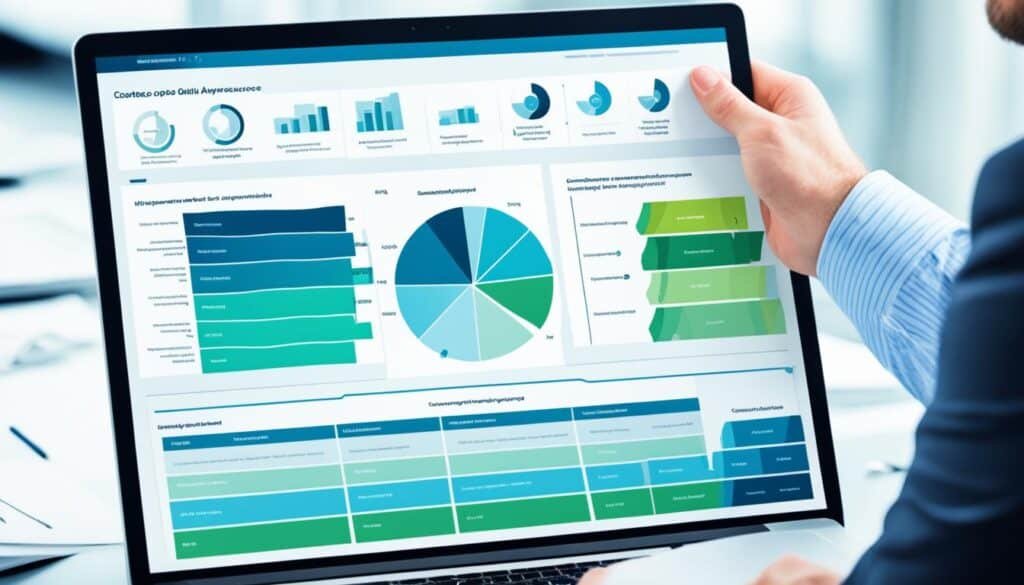Data analysts play a crucial role in uncovering insights and driving business growth through data analysis. With a bachelor’s degree in computer science or a related field, data analysts utilize their analytical skills to transform raw data into meaningful information. In this article, we will explore the top 10 data analyst jobs in high demand, providing opportunities for career growth and competitive salaries.
Key Takeaways: Data Analyst Jobs
- Data analysts are essential in uncovering insights and driving business growth through data analysis.
- Top data analyst jobs offer opportunities for career growth and competitive salaries.
- A bachelor’s degree in computer science or a related field is typically required for data analyst positions.
- Data analysts transform raw data into meaningful information using their analytical skills.
- The field of data analysis encompasses various roles such as data scientists, business intelligence analysts, and data engineers.
Business Analyst
A business analyst acts as a data detective, diving deep into data sets to turn numbers into useful insights. This role requires a strong foundation in data analysis, a bachelor’s degree in a related field, and proficiency in business intelligence tools such as Tableau or Qlik. Excellent communication and problem-solving skills are also crucial for translating research into easy-to-understand reports for stakeholders. While there are entry-level positions available, most companies prefer candidates with 2-3 years of relevant experience.
The Role of a Business Analyst
A business analyst is responsible for analyzing data and providing valuable insights to support business decision-making. By examining data sets and using various statistical techniques, business analysts uncover trends, identify opportunities, and address challenges within an organization.
They work closely with stakeholders such as executives, managers, and team members to understand business goals, requirements, and priorities. This collaborative approach allows business analysts to effectively translate data into actionable insights that drive strategic initiatives and improve overall performance.
Key Skills and Qualifications
To excel as a business analyst, individuals need a strong foundation in data analysis and a deep understanding of business intelligence tools. Proficiency in tools such as Tableau or Qlik enables analysts to visualize data and present findings in a clear and concise manner.
Additionally, excellent communication skills are vital for effectively conveying complex data analysis to diverse stakeholders. Business analysts must be able to communicate technical information in a way that is easily understandable to non-technical team members and decision-makers.
Problem-solving skills are also crucial as business analysts must identify and address issues within data sets, develop innovative solutions, and provide recommendations for improvement.
Experience and Career Growth
While entry-level positions in business analysis are available, most companies prefer candidates with 2-3 years of relevant experience. This experience allows analysts to develop a robust skill set, gain industry-specific knowledge, and sharpen their problem-solving abilities.
Business analysts often have diverse career growth opportunities. They can progress to senior analyst roles, become subject matter experts in specific industries, or transition to other data-related positions such as data scientist or data engineer.
Salary Outlook
The salary for business analysts varies based on factors such as the industry, location, company size, and level of experience. According to Payscale, the average annual salary for a business analyst in the United States is approximately $68,000.
| Experience Level | Average Annual Salary |
|---|---|
| Entry-level (0-2 years) | $58,000 |
| Mid-level (2-5 years) | $71,000 |
| Experienced (5+ years) | $85,000 |
Salary ranges may vary significantly based on individual skills, certifications, and additional responsibilities.
Data Scientist
Data scientists are highly skilled professionals who specialize in uncovering patterns and trends within raw data. With a deep understanding of coding and statistical models, they possess the ability to extract valuable insights and make data-driven decisions. Many data scientists hold advanced degrees, such as a Master’s or Ph.D., in fields like computer science or engineering.
Expertise in programming languages, particularly Python, is essential for data scientists to manipulate and analyze large datasets efficiently. Python’s versatility and extensive libraries make it a popular choice in the field. Moreover, data scientists must possess excellent communication skills to effectively convey complex concepts to both technical and non-technical stakeholders. Creative problem-solving abilities are also crucial for presenting intricate knowledge in an accessible and actionable manner.
While there are entry-level data scientist positions available for those who have recently completed their education, companies often prefer candidates with 3-5 years of hands-on experience. This experience demonstrates a solid understanding of the field and the ability to handle real-world data challenges. With the increasing demand for data scientists across industries, acquiring the necessary skills and experience is a valuable investment for those seeking a rewarding career in this flourishing field.
| Data Scientist Skills | Qualifications |
|---|---|
| Coding | Proficiency in programming languages, especially Python |
| Statistical Models | Knowledge of statistical models and techniques |
| Master’s or Ph.D. | Advanced degree in computer science, engineering, or related field |
| Communication Skills | Ability to convey complex concepts to technical and non-technical stakeholders |
| Problem-Solving | Creative problem-solving skills to present intricate knowledge in an accessible way |
| Experience | 3-5 years of hands-on experience in data analysis and manipulation |
Senior Data Analyst
A senior data analyst, also known as a computer systems analyst, plays a pivotal role in a company’s data-driven strategies. With extensive experience and a deep understanding of the industry, senior data analysts make significant contributions to their organizations.
These professionals possess strong leadership skills, allowing them to guide and mentor junior analysts. Their expertise in data analysis and industry knowledge enables them to collaborate effectively with other departments, ensuring the successful implementation of data-driven initiatives.
Senior data analysts are responsible for taking on greater initiatives and driving innovation within their organizations. They leverage their experience and technical expertise to analyze complex data sets and provide valuable insights that inform crucial business decisions.
Communication skills are essential for senior data analysts as they must effectively convey their findings and recommendations to stakeholders in a clear and concise manner. Leadership abilities enable them to inspire and motivate their team, fostering a collaborative and productive work environment.
To excel in this role, most companies expect senior data analysts to have at least five years of experience in the field. A bachelor’s degree in mathematics or computer science is also typically required, providing a solid foundation in quantitative analysis and data manipulation.
Overall, senior data analysts possess a unique blend of experience, technical expertise, leadership skills, and industry understanding. Their contributions are invaluable in harnessing the power of data to drive innovation, optimize performance, and achieve business objectives.
Data Engineer
Data engineers are vital members of a data-driven organization, responsible for designing, building, and maintaining the systems that store and process a company’s data. They possess a wide range of technical skills, including programming, knowledge of big data technologies, and SQL. Collaboration and teamwork are essential qualities for data engineers as they work closely with other data professionals to ensure the smooth operation of complex data pipelines.
In order to excel in this role, data engineers should have 3-5 years of experience, as this allows them to develop a deep understanding of the intricacies of data engineering and effectively tackle challenges that arise. Their programming expertise enables them to develop efficient and scalable data solutions, leveraging big data technologies to process massive amounts of information.
Strong teamwork and collaboration skills are instrumental in working alongside data scientists, data analysts, and other stakeholders to define and meet business goals. Data engineers are integral to cross-functional teams, using their technical knowledge to bridge the gap between data and actionable insights. By collaborating with colleagues and understanding their needs, data engineers can create robust data systems that empower data-driven decision-making.
“Data engineering is the foundation upon which data analytics and business intelligence thrive. It’s the invisible force that ensures data flows seamlessly and enables organizations to unlock the full potential of their data assets.”
Through their contributions to data architecture, data engineers play a critical role in building scalable and reliable data infrastructures that support the organization’s growth and analytical needs.
Technical Skills for Data Engineers:
- Proficiency in programming languages such as Python, Java, or Scala
- Experience with big data technologies like Hadoop, Spark, or Apache Kafka
- Knowledge of database technologies such as SQL, NoSQL, or cloud-based platforms
- Understanding of data modeling and schema design
- Strong problem-solving and troubleshooting abilities
Key Responsibilities of a Data Engineer
| Responsibilities | Description |
|---|---|
| Data Pipeline Development | Designing and implementing scalable and efficient data pipelines to collect, process, and transform data from various sources. |
| Data Storage and Management | Creating and maintaining data storage solutions, ensuring data integrity, security, and accessibility. |
| Database Design | Developing and optimizing database structures, ensuring efficient data retrieval and storage. |
| Data Quality and Governance | Implementing data quality controls, monitoring data pipelines, and ensuring compliance with data governance policies. |
| Collaboration and Communication | Collaborating with cross-functional teams, communicating technical requirements, and translating business needs into data solutions. |
A successful data engineer possesses a unique combination of technical expertise, problem-solving skills, and collaborative mindset, enabling organizations to leverage their big data assets and drive meaningful insights. With the growing demand for skilled data engineers, this role offers ample opportunities for growth and career advancement in the data-driven landscape.
Quality Assurance Analyst

Quality assurance analysts are essential to ensuring that products or software meet the highest standards of quality. They play a critical role in the development process by implementing meticulous tests, analyzing data, and collaborating with different departments to identify and resolve potential issues.
One of the key responsibilities of a quality assurance analyst is to conduct a variety of tests to validate the functionality, usability, and performance of a product or software. They use a range of testing tools and techniques to thoroughly examine every aspect, ensuring that it meets the requirements and specifications.
Attention to detail is paramount in this role, as quality assurance analysts must meticulously document and track defects, issues, and resolutions. They are responsible for maintaining comprehensive documentation to facilitate communication and provide a clear understanding of the testing process.
Effective communication skills are crucial for quality assurance analysts, as they need to collaborate and coordinate with different teams, including developers, designers, and project managers. Clear communication helps ensure that any identified issues are resolved promptly and efficiently.
In addition to technical skills, quality assurance analysts must possess strong analytical abilities. They need to interpret and analyze data to draw meaningful insights and provide recommendations for continuous improvement. By analyzing test results and identifying trends, they can contribute to the overall enhancement of the product or software.
Soft Skills for Quality Assurance Analysts:
- Attention to detail
- Exceptional communication skills
- Strong analytical abilities
- Collaboration and teamwork
“Quality is never an accident; it is always the result of intelligent effort.” – John Ruskin
Quality assurance analyst roles often offer excellent entry-level opportunities for individuals interested in starting their careers in the field of quality assurance. Many companies provide comprehensive training and mentorship programs to help individuals develop the necessary skills and expertise.
| Key Skills | Responsibilities | Qualifications |
|---|---|---|
| Testing Tools | Conducting tests to evaluate product or software quality | Bachelor’s degree in computer science or related field |
| Soft Skills | Collaborating with different teams and communicating effectively | Attention to detail and exceptional communication skills |
| Attention to Detail | Meticulously documenting and tracking defects | Strong analytical abilities |
Network Analyst

Network analysts play a critical role in maintaining and optimizing a company’s digital infrastructure. As experts in troubleshooting and optimizing networks, they ensure smooth operations and minimize downtime. Their strong technical skills and ability to collaborate with cross-functional teams make them invaluable in solving both technical and business-related issues.
Network analysts stay updated on the latest advancements in hardware, software, and security protocols to ensure network efficiency and security. Through their expertise, they identify and resolve network performance issues, implement necessary upgrades, and optimize network operations. Their troubleshooting skills enable them to swiftly address network failures and minimize disruptions.
Most network analysts possess a bachelor’s degree in computer science or telecommunications, which equips them with a solid foundation in networking principles and practices. Additionally, many employers prefer candidates with a Cisco certification, such as Cisco Certified Network Associate (CCNA), as it demonstrates a high level of proficiency in Cisco networking technologies.
The role of a network analyst goes beyond technical proficiency. Collaboration is a key aspect of their work, as they collaborate with other IT professionals and stakeholders to understand business requirements and align network solutions accordingly. Effective communication skills enable them to explain technical concepts to non-technical individuals, making their insights accessible to all stakeholders.
Key Responsibilities of a Network Analyst:
- Troubleshooting and resolving network issues
- Optimizing network performance
- Staying updated on latest hardware, software, and security protocols
- Collaborating with cross-functional teams
- Implementing network upgrades and enhancements
- Monitoring network performance and security
Skills Required:
- Strong technical skills in network troubleshooting and optimization
- Knowledge of hardware, software, and security protocols
- Understanding of networking principles and practices
- Ability to collaborate and work effectively in cross-functional teams
- Excellent communication skills to convey technical concepts to non-technical stakeholders
A career as a network analyst offers opportunities for professional growth and development. With increasing reliance on digital infrastructure, the demand for skilled network analysts continues to grow across industries.
Network analysts play a crucial role in maintaining and optimizing digital infrastructures.
Production Analyst

A production analyst plays a critical role in optimizing manufacturing processes to enhance efficiency and reduce costs. By evaluating production data and identifying bottlenecks, they can implement strategic measures to improve overall operations. Drawing on strong communication skills and a background in business or a technical field, production analysts are able to facilitate informed decision-making across departments.
Companies seeking production analysts typically value candidates with 2-3 years of experience in production or manufacturing. With their expertise, these professionals can contribute significantly to streamlining processes and achieving cost reduction goals.
“Efficiency is doing things right; effectiveness is doing the right things.” – Peter Drucker
Effective production analysts analyze production metrics, such as cycle time, productivity, and equipment utilization, to identify areas for improvement. By implementing data-driven strategies, they can enhance efficiency, increase output, and minimize waste. Their efforts result in optimized manufacturing operations and ultimately contribute to improved business performance.
The Role of a Production Analyst
Production analysts play a crucial role in business decisions by providing valuable insights based on their analysis of manufacturing data. Their responsibilities include:
- Evaluating production data to identify trends and patterns
- Pinpointing bottlenecks and areas for improvement
- Developing and implementing strategies to enhance efficiency and reduce costs
- Collaborating with cross-functional teams to implement decisions and processes
- Monitoring and reporting on key performance indicators (KPIs)
By conducting thorough analyses and implementing data-driven solutions, production analysts contribute to the success of manufacturing operations.
| Key Skills | Experience |
|---|---|
| Strong data analysis and problem-solving skills | 2-3 years of experience in production or manufacturing |
| Excellent communication and collaboration abilities | |
| Background in business or a technical field |
Success as a production analyst requires a combination of technical expertise and interpersonal skills. The ability to analyze complex data sets, communicate effectively with stakeholders, and work collaboratively across departments are key components of the role.
With 2-3 years of experience in production or manufacturing, production analysts are equipped to tackle challenges, drive process improvements, and contribute to the overall success of organizations in the manufacturing sector.
Compensation Analyst

A compensation analyst plays a pivotal role in designing and analyzing employee benefits programs to ensure fairness and competitiveness within an organization. Their expertise lies in evaluating market trends, reviewing salary data, and making informed recommendations to align pay scales with industry standards. This strategic role requires exceptional data analysis skills, as they analyze complex data sets and conduct in-depth market research to inform their decisions.
Communication skills are also essential for compensation analysts as they collaborate with various stakeholders, including HR teams and senior management, to design comprehensive and effective compensation packages. They must effectively communicate their findings and recommendations to ensure buy-in and understanding across the organization.
To excel as a compensation analyst, professionals typically hold a bachelor’s degree in human resources, finance, or a related field. Additionally, certifications like Certified Compensation Professional (CCP) or Professional in Human Resources (PHR) are highly valued and demonstrate a strong understanding of compensation principles and practices.
The Role of a Compensation Analyst:
“Compensation analysts are dedicated to ensuring that employee benefits programs are competitive and aligned with industry standards. By leveraging their data analysis skills and market research, they provide valuable insights and recommendations to organizations, helping to attract and retain top talent.”
Employers often seek candidates with at least three years of experience in compensation analysis or a related field. This experience allows professionals to develop a comprehensive understanding of compensation strategies, industry best practices, and the ability to navigate complex data sets.
Compensation Analyst Skills:
- Data analysis: Ability to analyze and interpret complex data sets to identify trends, patterns, and valuable insights.
- Market research: Expertise in conducting thorough market research to stay updated on industry trends and salary benchmarks.
- Communication skills: Strong verbal and written communication skills to effectively convey analysis findings and recommendations to stakeholders.
- Attention to detail: Keen eye for detail to ensure accuracy in compensation data analysis and calculations.
- Problem-solving: Ability to identify compensation-related challenges and propose effective solutions.
Certifications for Compensation Analysts:
| Certification | Description |
|---|---|
| Certified Compensation Professional (CCP) | A globally recognized certification that validates expertise in compensation design, analysis, and management. |
| Professional in Human Resources (PHR) | A credential for HR professionals that encompasses a range of HR topics, including compensation and benefits management. |
With their specialized knowledge and skills, compensation analysts play a crucial role in maintaining a fair and competitive compensation structure within organizations. They ensure that employee benefits programs align with market trends, industry standards, and the organization’s overall goals and values.
Data Analytics Specialist

Data analytics specialists are highly skilled professionals who specialize in uncovering trends and patterns from complex data sets. With their advanced technical knowledge and expertise, they develop innovative methodologies and techniques to delve deep into data and tackle specific business challenges. These specialists are adept at working with diverse data sets, utilizing their advanced analytical skills to extract valuable insights that drive informed decision-making.
One of the key qualifications for a data analytics specialist is a bachelor’s degree or higher in business or commerce. This educational background equips them with the necessary foundation to understand the strategic implications of their data analysis. Additionally, certifications in certain niches within data analytics can further enhance their expertise and credibility in the field.
In this role, advanced technical knowledge is essential. Data analytics specialists possess a deep understanding of statistical analysis, data visualization, and data mining techniques. They are proficient in various programming languages, such as Python or R, and are skilled in using advanced software and tools for data analysis. Their expertise allows them to manipulate large data sets and apply advanced statistical models to derive meaningful insights.
Effective communication skills are also crucial for data analytics specialists. These professionals need to be able to articulate their findings in a clear and concise manner, translating complex data into actionable information that can be readily understood by stakeholders. Their ability to communicate effectively facilitates collaboration with cross-functional teams and ensures the successful implementation of data-driven strategies.
Data analytics specialists often bring experience from other roles in the data field. Their prior experience in data analysis, data science, or related roles provides them with a comprehensive understanding of data management principles and industry best practices. This diverse experience enables them to approach data challenges from different angles and leverage their expertise to address intricate data puzzles.
Overall, data analytics specialists play a vital role in driving business success by unlocking valuable insights from data. Their advanced methodologies, technical knowledge, and communication skills make them indispensable in today’s data-driven business landscape.
| Skills | Qualifications | Responsibilities |
|---|---|---|
| Advanced technical knowledge | Bachelor’s degree or higher in business or commerce | Uncovering trends and patterns from complex data sets |
| Communication skills | Certifications in specific data analytics niches | Developing advanced methodologies and techniques |
| Problem-solving abilities | Experience in data analysis, data science, or related roles | Addressing specific business challenges |
Junior Data Analyst

Junior data analysts are invaluable members of the data-driven world, actively contributing to uncovering insights and driving business growth through meticulous data analysis. Although they possess a solid foundation in data analysis and programming languages, their experience in the field is typically limited. As juniors embark on their careers, they focus on honing their hard skills and developing crucial soft skills like teamwork, communication, and adaptability.
In their role, junior data analysts utilize their technical expertise in data analysis and programming languages to manipulate and interpret complex datasets. Their analytical mindset enables them to extract actionable information and generate data-driven insights that support effective decision-making within organizations.
Working collaboratively in a team environment, junior data analysts actively contribute to the overall success of projects. They collaborate with experienced professionals, leveraging their diverse perspectives to improve data analysis processes and generate more accurate results. Through teamwork, they gain exposure to real-world challenges and develop innovative solutions.
Effective communication skills are vital for junior data analysts to convey their findings and insights to stakeholders within the organization. Articulating complex data in a clear and concise manner enables them to drive data-driven decision-making and foster a culture of data literacy across teams and departments.
Key Responsibilities of Junior Data Analyst:
- Conduct data analysis and provide support in data-driven decision-making processes.
- Perform data collection, cleansing, and validation to ensure data accuracy and integrity.
- Utilize programming languages, such as Python or R, to manipulate and analyze data.
- Create comprehensive reports and visualizations to present data-driven insights.
- Collaborate with cross-functional teams to identify business requirements and address data-related challenges.
- Stay updated with the latest trends and advancements in data analysis and programming languages.
“As a junior data analyst, your passion for data-driven insights and your commitment to continuous learning will propel your career in the dynamic field of data analysis. Embrace every opportunity to enhance your skills and contribute meaningfully to the data-driven strategies of organizations.”
As junior data analysts gain experience, their career prospects expand, opening doors to more advanced roles in the data analytics field. By continuously developing their technical and soft skills, they can progress to become proficient data professionals capable of tackling complex challenges and driving business success.
| Skills Required | Description |
|---|---|
| Data Analysis | Proficiency in analyzing and interpreting data to uncover valuable insights. |
| Programming Languages | Knowledge of programming languages like Python, R, or SQL for data manipulation and analysis. |
| Teamwork | Ability to collaborate effectively with cross-functional teams to achieve common goals. |
| Communication Skills | Strong verbal and written communication skills to convey complex data findings to stakeholders. |
Aspiring junior data analysts can start their careers in entry-level positions that provide hands-on experience and opportunities for growth. Through their dedication to continuous learning and practical application of data analysis skills, junior data analysts can pave the way for a successful and fulfilling career in the data-driven world.
Also Read: Combating Job Burnout: The Power of Work-Life Balance
Conclusion
The field of data analytics offers exciting career opportunities across diverse industries. As data becomes increasingly valuable in today’s digital age, the demand for skilled data analysts continues to grow. These professionals play a crucial role in unlocking insights, driving business growth, and making informed decisions based on data analysis.
Data analyst jobs provide competitive salaries and numerous growth prospects. Companies across various sectors rely on data analysts to extract actionable information from complex datasets, enabling them to make strategic business decisions. From finance and healthcare to e-commerce and marketing, data analysts have the opportunity to work in a wide range of industries, contributing to their success through data-driven insights.
By honing their skills in data analytics, professionals can position themselves for promising and lucrative careers. As new technologies and techniques emerge, data analysts must stay up-to-date with the latest trends and tools in the field. Ongoing learning and professional development are essential to remain competitive in the job market and continue advancing in this data-driven world.
With its dynamic nature, the field of data analytics promises an exciting journey for those who choose to pursue a career in it. Whether starting as a junior data analyst or aiming for a senior role, the opportunities for growth and advancement in this field are abundant. As businesses increasingly rely on data to gain a competitive edge, data analysts will continue to play a vital role in shaping the future of industries worldwide.
FAQs
Q: What is a data analyst job description?
A: A data analyst job description typically involves collecting, processing, and analyzing data to help organizations make informed decisions. Data analysts also create visualizations and reports to present their findings.
Q: Where can I find the full job description for a data analyst position?
A: You can find the full job description for a data analyst position on job boards like Indeed.com or on company websites under their career opportunities section.
Q: What are some key details usually included in a data analyst job post?
A: Data analyst job posts often include requirements such as educational background, experience level, specific job responsibilities, skills required, and information on how to apply.
Q: Are there resources available to help with creating a resume for a data analyst job?
A: Yes, there are resume resources tailored for data analyst positions that can be found online. These resources offer tips on formatting, highlighting relevant skills, and showcasing data analysis experience.
Q: Where can I find career resources for data analysts?
A: Career resources for data analysts are available on websites specializing in data-related careers. These resources may include job search tips, interview preparation advice, and industry insights.
Q: How can employers benefit from using data analyst profiles?
A: Employers can gain valuable insights from data analyst profiles by understanding the candidate’s skills, experience, and expertise in data analysis. This can help in identifying the right fit for a data analyst role within the organization.
Q: What is data visualization and why is it important for data analysts?
A: Data visualization is the graphical representation of data to help communicate complex information clearly and effectively. Data analysts use visualization tools to present their findings visually, making it easier for stakeholders to interpret the data.
Q: What are some specialized roles within the field of data analysis?
A: Some specialized roles within data analysis include data specialist, systems analyst, healthcare data analyst, data quality analyst, business intelligence analyst, and big data analyst, among others.
Q: How important is data quality in the role of a data analyst?
A: Data quality is crucial for data analysts as they rely on accurate and reliable data to draw meaningful insights and make informed decisions. Data analysts often work on improving data quality and ensuring data integrity.
